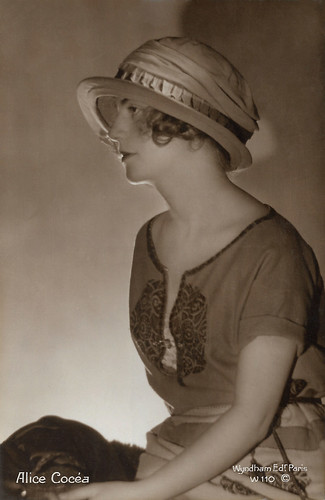
French postcard by Wyndham Ed., Paris, no. W110.
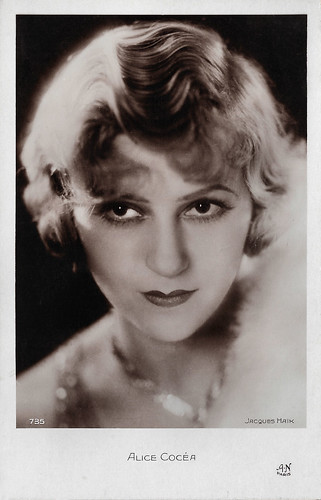
French postcard by A.N., Paris, no. 735. Photo: Jacques Haïk.
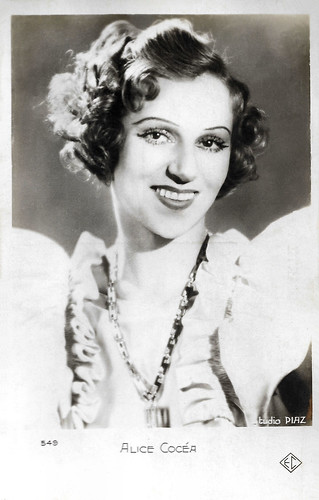
French postcard by E.C., Paris, no. 549. Photo: Studio Piaz.
Star position in the Parisian theatre scene
Alice Cocéa, originally Sophie Alice Cocéa, was born in 1899 in Sinaia (Romania) as the daughter of General Dimitrie Cocea and his wife Cleopatra. Alice had one sister, Florica (later married Bressy) and one brother, Nicolae, the later socialist journalist and novelist N. D. Cocea. The Cocea family was of Albanian origin. Alice was the aunt of actress Dina Cocea.
Cocéa initially attended courses at the Conservatory in Bucharest but then studied drama in Paris. She graduated in 1917 and settled in France. She made her film debut in the film Le Delai (Jacques de Baroncelli, 1918). But she preferred to pursue a - successful - theatrical and operetta career. She appeared in two operettas by Henri Christiné and Albert Willemetz, 'Phi-Phi' (1918) and Dédé (1921), the latter with Maurice Chevalier.
In the 1920s, she performed e.g. at the Comédie Caumartin, Théâtre Daunou, Théâtre Michel, and the Comédie des Champs-Élysées. Some of her songs were recorded on records. From her star position in the Parisian theatre scene, Alice Cocéa returned to the big screen in 1930 and had a fruitful film career in the early 1930s. Her first sound film was Mon gosse de père/My Kid of a Father (Jean de Limur, 1930), starring Adolphe Menjou, while she had the female lead as his young wife. The film was the alternate French version of The Parisian (1931), in which Elissa Landi played Cocéa's part. Both versions were filmed at the Pathé-Natan studio in Paris.
At the Paris Paramount studios, Cocéa was paired with a young Fernand Gravey in Marions-nous/Let's Get Married (Louis Mercanton, 1931); with Jean Angelo and Florelle in Atout coeur/Heart trump (Henry Roussel, 1931), in which she had a popular song, 'Si j'aimais'; and with Henri Garat in Delphine (Roger Capellani, 1931). Next, at the Studio Jacques Haïk, she starred opposite André Roanne in Nicole et sa vertu/Nicole and Her Virtue (René Hervil, 1932). She played a wife who acts as a mundane woman just to get her husband back. In 1934 she acted with Harry Baur in Le greluchon délicat/A Sensitive Lad (Jean Choux, 1934), in which she supports a penniless student, played by Paul Bernard. The previous year, Baur had directed her on stage in 'La Voie lactée' by Alfred Savoir, at the Théâtre des Mathurins.
In 1926, Cocéa married Count Stanislas de Rochefoucauld, but the marriage ended in divorce in 1931. Her affair with Lieutenant Victor Point, Marcellin Berthelot's great-grandfather, ended in 1932 with his suicide after Alice's refusal to marry him after her divorce. They had been involved for three years, and she had promised to become his wife once her divorce from Rochefoucauld had been settled. Cocéa announced her retirement shortly after Point's death, stating that she would join a convent.
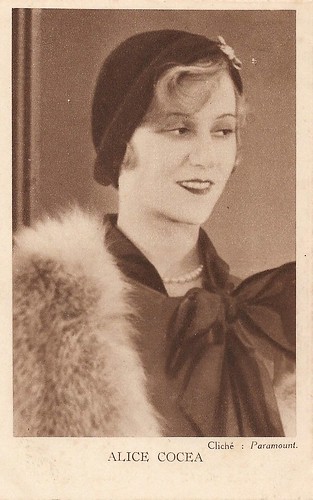
Belgian postcard by S.A. Cacao et Chocolat Kivou, Vilvoorde / N.V. Cacao en Chocolade Kivou, Vilvoorde.
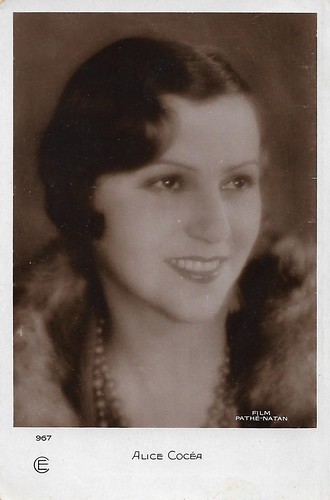
French postcard by Cinémagazine-Edition, Paris, no. 967. Photo: Film Pathé-Natan.
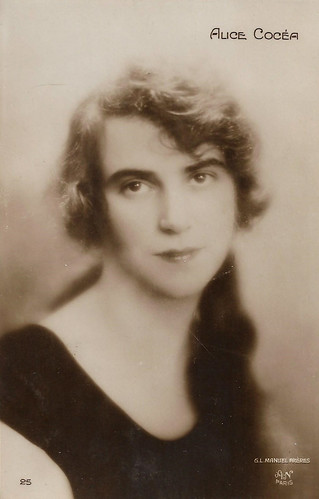
French postcard by A.N., Paris, no. 25. Photo: G.L. Manuel Frères.
Forbidden for its immorality
In the later 1930s, Alice Cocéa only did theatre. From 1937 she both acted and directed at the Théâtre des Ambassadeurs, run on behalf of the City of Paris by her husband Roger Capgras (1900-1963), a former fruit vendor of Les Halles, who thanks to his business in fruit juices had become an important Maecenas of the press and the theatre. Capgras was an editor at the Germanophile Paris-Soir and founded in 1940 an independent newspaper, Aujourd'hui, which during the Occupation became a source of propaganda for the Nazis.
During the Occupation, Capgras himself, who first had tried to make friends with the occupiers, was interned. In 1941, he fled to North Africa and was interned there too, but also helped British 'Toppy' Black to open a series of clubs for British soldiers in Algiers and Tunis. After the war, he would be a mediator between his friend Prime Minister Edgar Faure, the French army, and the local Moroccan authorities.
On 14 November 1938, Alice Cocéa directed and acted on the first night of 'Les Parents terribles' by Jean Cocteau at the Théâtre des Ambassadeurs. In the play, Georges (Marcel André) plays a gentle and dreamy father, who is entirely dominated by the whims of his wife, Yvonne (Germaine Dermoz), a diabetic who suffers from frequent illnesses. With Michel (Jean Marais), their adored son, the parents live on the hook of Léonie (Gabrielle Dorziat), who was once the fiancee of Georges who preferred his sister to him. These four people live together until the day when Madeleine (Cocéa), Georges' mistress and the son's new lover arises.
According to French Wikipedia, Roger Capgras came to the rescue with his theatre when Cocteau could not find a theatre to stage his new play. Cocéa, then Capgras' mistress, would play Madeleine instead of Madeleine Ozeray, Cocteau's initial choice. Yvonne, a role intended for Yvonne de Bray, was played by Dermoz. The play was a huge critical success, if not by the far-right, and neither by the City of Paris when Capgras wanted to invite Parisian high school pupils to the play. The play became forbidden for its immorality and closed down on 20 December 1938. The radical press came to Cocteau's rescue and the play was retaken at the Théâtre des Bouffes Parisiens, where it was on show between January and June 1939. From 1940 to 1944, Cocéa was director of the Théâtre des Ambassadeurs, where she alternated stage directions of serious work by Molière and Ibsen with lighter work by Feydeau and others.
At the war's end, she was arrested on charges of collaboration and was imprisoned for some time. However, from 1947 she returned some 15 times to the stage as an actress and also five times as a director. Her memoirs, 'Mes amours que j'ai tant aimées' (The Loves I So Loved), were published in 1958. During the 1960s, she had two bit-part appearances in the cinema. Her last screen appearance was as a concierge in Roger Vadim's La Ronde/Circle of Love (1964), starring Jane Fonda. After her retirement, she dedicated herself to her passion for painting. Alice Cocéa died in 1970, after a short illness. She was 70. Cocéa was buried at the cemetery of Saint-Brisson-sur-Loire. Her cousin Armand de La Rochefoucauld recently rehabilitated her grave.

French postcard by P.C., Paris, no. 86.
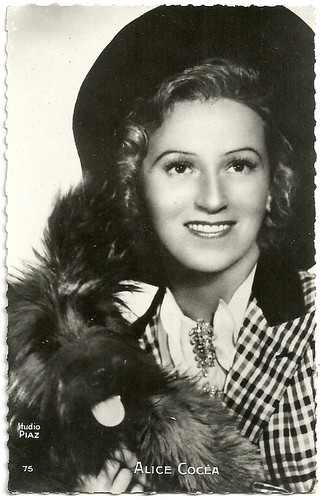
French postcard, no. 75. Photo: Studio Paz.
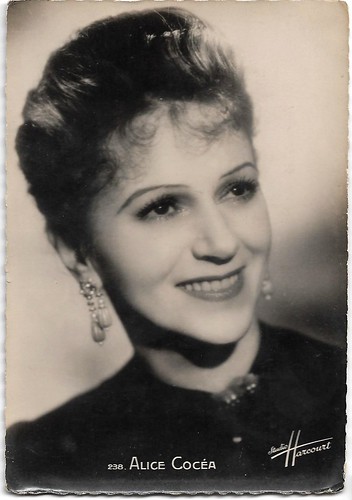
French postcard, no. 238. Photo: Studio Harcourt.
Sources: Caroline Hanotte (CinéArtistes - French), Wikipedia (French, English and Romanian), and IMDb.
This post was last updated on 30 September 2023.
1 comment:
Post a Comment